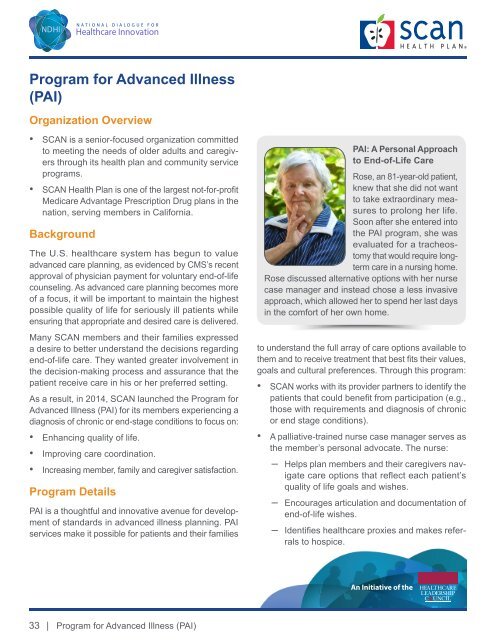VIable
HLCCompendium
HLCCompendium
You also want an ePaper? Increase the reach of your titles
YUMPU automatically turns print PDFs into web optimized ePapers that Google loves.
NDHI<br />
NAT IONAL DIALOGUE FOR<br />
Healthcare Innovation<br />
Program for Advanced Illness<br />
(PAI)<br />
Organization Overview<br />
• SCAN is a senior-focused organization committed<br />
to meeting the needs of older adults and caregivers<br />
through its health plan and community service<br />
programs.<br />
• SCAN Health Plan is one of the largest not-for-profit<br />
Medicare Advantage Prescription Drug plans in the<br />
nation, serving members in California.<br />
Background<br />
The U.S. healthcare system has begun to value<br />
advanced care planning, as evidenced by CMS’s recent<br />
approval of physician payment for voluntary end-of-life<br />
counseling. As advanced care planning becomes more<br />
of a focus, it will be important to maintain the highest<br />
possible quality of life for seriously ill patients while<br />
ensuring that appropriate and desired care is delivered.<br />
Many SCAN members and their families expressed<br />
a desire to better understand the decisions regarding<br />
end-of-life care. They wanted greater involvement in<br />
the decision-making process and assurance that the<br />
patient receive care in his or her preferred setting.<br />
As a result, in 2014, SCAN launched the Program for<br />
Advanced Illness (PAI) for its members experiencing a<br />
diagnosis of chronic or end-stage conditions to focus on:<br />
• Enhancing quality of life.<br />
• Improving care coordination.<br />
• Increasing member, family and caregiver satisfaction.<br />
Program Details<br />
PAI is a thoughtful and innovative avenue for development<br />
of standards in advanced illness planning. PAI<br />
services make it possible for patients and their families<br />
PAI: A Personal Approach<br />
to End-of-Life Care<br />
Rose, an 81-year-old patient,<br />
knew that she did not want<br />
to take extraordinary measures<br />
to prolong her life.<br />
Soon after she entered into<br />
the PAI program, she was<br />
evaluated for a tracheostomy<br />
that would require longterm<br />
care in a nursing home.<br />
Rose discussed alternative options with her nurse<br />
case manager and instead chose a less invasive<br />
approach, which allowed her to spend her last days<br />
in the comfort of her own home.<br />
to understand the full array of care options available to<br />
them and to receive treatment that best fits their values,<br />
goals and cultural preferences. Through this program:<br />
• SCAN works with its provider partners to identify the<br />
patients that could benefit from participation (e.g.,<br />
those with requirements and diagnosis of chronic<br />
or end stage conditions).<br />
• A palliative-trained nurse case manager serves as<br />
the member’s personal advocate. The nurse:<br />
––<br />
Helps plan members and their caregivers navigate<br />
care options that reflect each patient’s<br />
quality of life goals and wishes.<br />
––<br />
Encourages articulation and documentation of<br />
end-of-life wishes.<br />
––<br />
Identifies healthcare proxies and makes referrals<br />
to hospice.<br />
An Initiative of the<br />
33 |<br />
Program for Advanced Illness (PAI)


